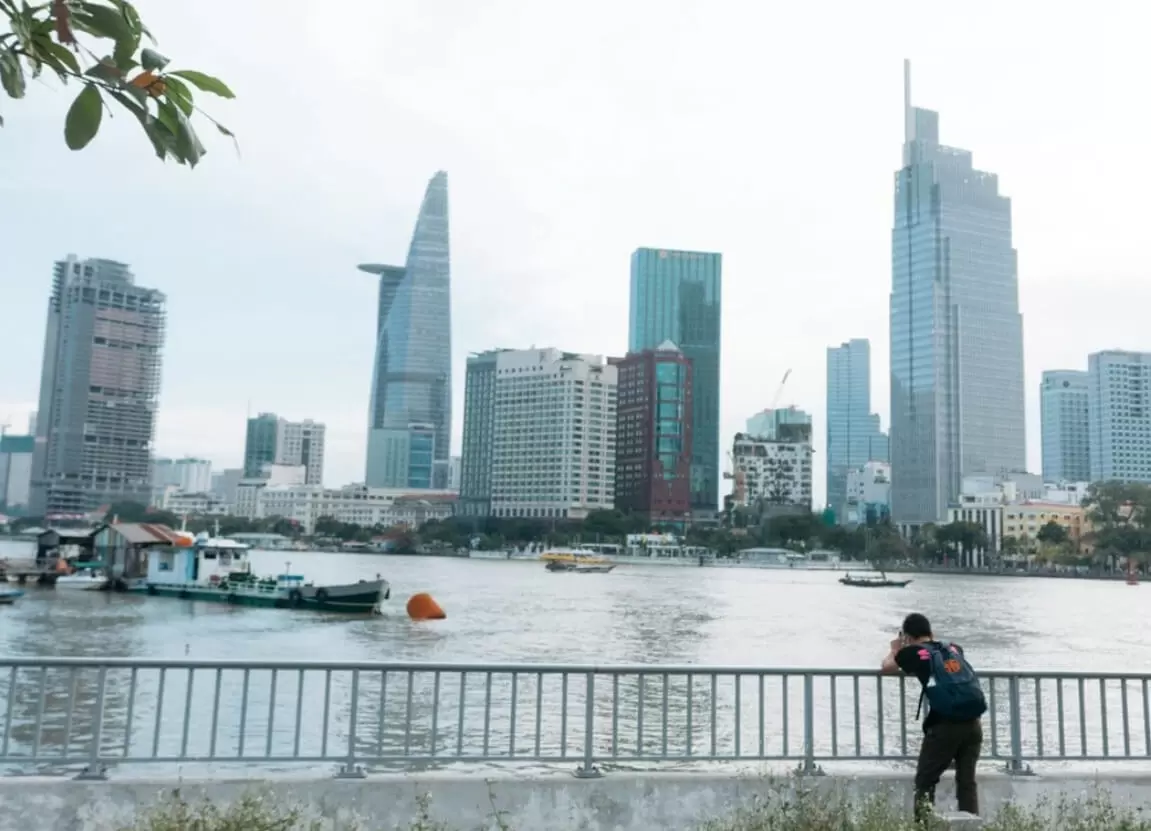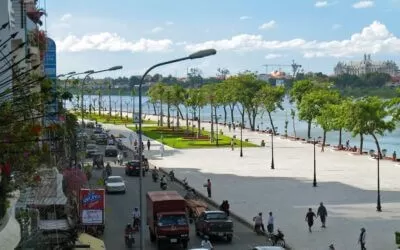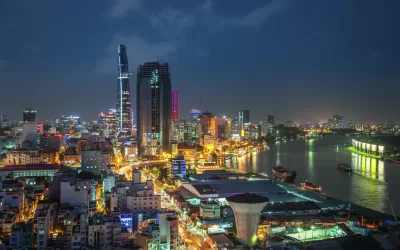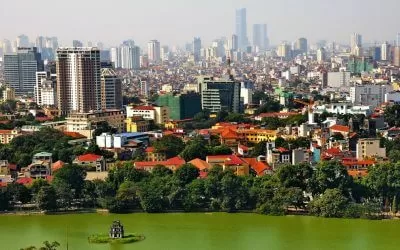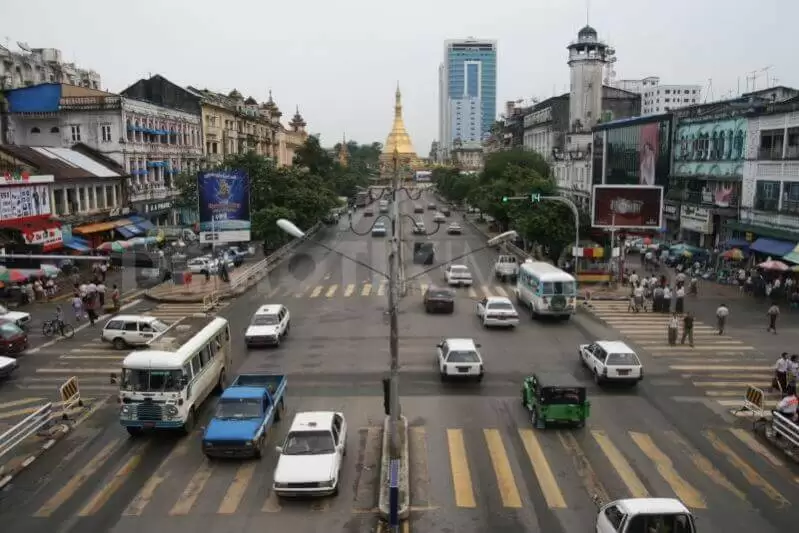Last updated December 27th, 2023.
Officially, Vietnam remains one of the few communist countries left on earth.
Yet, over the past few decades, this rapidly growing nation of 100 million people has become a capitalist powerhouse.
The Vietnamese government realized a state-controlled economy wouldn’t effectively ride Southeast Asia’s wave of growth. Nor would it take full advantage of an ongoing foreign investment influx and the nation’s rising middle class.
So, Vietnam took steps to ensure a smooth transfer of control from the state into the hands of private business owners. It hasn’t always been easy, though.
A brief history of the Vietnamese economy would cover the nation’s extremely high GDP growth rate, often exceeding 8% annually in the late 1980s and 1990s following the war.
Growth fell below 7% on average by the 2010s. While this still ranked Vietnam among Asia’s best-performing countries, it didn’t meet analyst expectations.
Looking back at a 2005 report by Goldman Sachs, Vietnam’s economy was predicted to become the world’s 35th largest economy, with a per capita GDP of $4,357 by 2020.
Vietnam’s GDP per capita is at US$4,316 nowadays. It’s an impressive feat, considering how the world’s economy was severely hit by COVID-19 that year, something Goldman Sachs surely couldn’t foresee. Still, it isn’t there yet.
But Vietnam’s economy isn’t doing poorly by any means, either. It’s one of the ASEAN region’s top performers besides Cambodia and the Philippines (and sometimes, Indonesia).
More so than that, Vietnam’s economy avoided every single recession in the past 30 years. They sustained positive GDP growth during every single one, from the Asian Financial Crisis to the US-China Trade War. It’s also one of the few countries benefiting from said war.
This rare type of long-term recession avoidance is an excellent sign of Vietnam’s stability and a claim that only a handful of countries can make.
Does all this really make Vietnam immune from the rest of the world’s crises, though? Likewise, can its economy remain the strongest in Asia? Let’s take a look.

Multinational firms, including Nike, Samsung, and hundreds of others, are setting up operations in Vietnam. Not only to produce goods but to sell them to the nation’s growing consumer class.
The Most Capitalist, Communist Country on Earth
Vietnam tends to exceed the world economy’s highs and miss its lows. Nonetheless, it’s fully integrated with the global market and isn’t completely immune to crisis.
A rising manufacturing power and arguably one of the best places to invest in Asia, Vietnam has an economy that relies on the large amount of FDI it receives.
Considering recent worldwide instability, foreign business owners in Vietnam hope for a more focused approach by the government. Companies want the economy to be on par with global standards.
Vietnam’s economy lost some hype between contagion and travel bans over the years. Fortunately, the investment appeal isn’t gone by any means.
You may already know that factories are moving out of China and into nearby countries for political and economic reasons. Vietnam is among the top beneficiaries of this trend.
Not only does Vietnam outcompete China on labor costs and bureaucracy, but the fact that they share a land border makes it easy to relocate existing operations between the two from a logistics perspective.
Vietnam’s stock market is sizable and growing, with about 400 publicly listed companies on the Ho Chi Minh City Stock Exchange (HOSE) and a market cap above US$250 billion.
Furthermore, Vietnam has shown signs that they could open to foreign freehold property ownership. Currently, it’s only possible to lease land from the state long-term.
The government has taken concrete steps to make real estate investment easier, though, allowing foreigners married to Vietnamese citizens to own freehold property. Laws will probably get easier going forward.
Obstacles to Growth in Vietnam’s Economy?
Vietnam has something they must deal with while the global economy is in shambles. It’s perhaps an unnecessary problem, but it remains a significant obstacle to growth.
State-owned enterprises dominate much of Vietnam’s economy. Such businesses, which the government either partially or fully controls, are less efficient than private firms.
You’ll find plenty of research studies and proof saying that private companies enjoy greater profitability. A developing country’s leaders often don’t care about efficiency, though. It’s simply not their primary goal.
The world notices this, and international players have tried to help change the role Vietnam’s government plays.
With greater FDI and reform to its domestic market, Vietnam is targeting sustained growth of between 6.5% and 7% going forward.
Time will tell whether Vietnam will succeed in its long-term economic goals.
We don’t suggest buying property in Vietnam right now due to heavy restrictions on foreign buyers. Vietnam’s stock market has lots of potential, though.
Similarly, because of Vietnam’s rapid economic growth and demographic dividend, it ranks among the top Asian countries for starting a business.
If you don’t want to fly here to set up a brokerage account, the easiest way to invest in Vietnam is through an ETF.
The most popular exchange-traded funds include Vietnam Enterprise Investments Limited (VEIL) in the UK and VanEck Vietnam ETF (VNM) in the US.
In conclusion, Vietnam isn’t the most accessible country in Asia to invest in – certainly not concerning its real estate market. We absolutely think it’ll keep outperforming most developing economies, though.
Skip the Next Western Recession
Learn the best places to invest - and where to avoid - by downloading our free Investment Cheat Sheet.

